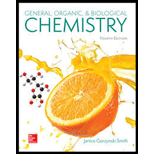
Concept explainers
(a)
Interpretation:
The chiral center in the leucine needs to be located.
Concept introduction:
A molecule is said to be chiral if it is asymmetric in nature. The chiral carbon is defined as a carbon atom attached to 4 different groups. The non-superimposable mirror images of the chiral molecule are known as its enantiomer. Molecules with planes of symmetry do not have chirality. The plane bisecting an object into two identical halves is known as the plane of symmetry. A molecule having a plane of symmetry in any conformation is always identical to its mirror image and such molecules are achiral in nature.
(b)
Interpretation:
The enantiomers of leucine needs to be drawn.
Concept introduction:
The enantiomer is a non-superimposable mirror image of the molecule having a chiral center. A molecule is said to be chiral if it is asymmetric in nature. The chiral carbon is defined as a carbon atom attached to 4 different groups.
(c)
Interpretation:
The Fischer projections for enantiomers of Leucine needs to be drawn.
Concept introduction:
For a molecule with a chiral center, the Fischer projection formula is written to describe the stereo arrangement of atoms in two dimensions. For large molecules with more than 1 stereocenters are also represent their stereochemistry using the Fischer Projection. The carbon chain of the molecule containing the chiral carbon center is represented as a vertical line with chiral carbon at the center. Two other groups are then horizontally arranged around the chiral carbon atom.
Want to see the full answer?
Check out a sample textbook solution
Chapter 15 Solutions
General, Organic, and Biological Chemistry - 4th edition
- Specify whether the configuration of the chirality center in the structure is R or S. (Other terms used for chirality center include chiral center, stereocenter, and stereogenic center.) ball & stick ♥ + labelsarrow_forwardCount the chirality centers in each molecule below. CHO CH, ndete O 4 chiral centers O3 chiral centers O1 hiral centerarrow_forwardLabel compounds as active or inactive and identify their chiral centersarrow_forward
- What is the configuration at the chiral centers of the Fischer projection of the molecule shown? (The molecule is drawn with C1 at the top and C5 at the bottom.)arrow_forwardAssign R or S configuration to each chirality center in the following molecules. First assign the configuration of the chirality center closest to the top of the Fischer projection. Then give the configuration of the other chirality center. CH₂OH -OH CH3CH₂ # H- -OCH3 CO₂H 1st structure: Top chirality center 2nd structure: Top chirality center H3C- H3C- OH -OH -H Other chirality center: ✓. Other chirality center: Varrow_forwardOCH3 HN- N. N. СООН Moxifloxacin Indicate the orientation around each of the labeled chirality centers in moxifloxacin. If there are only two chirality centers in the molecule choose none for the Center c.arrow_forward
- What is the configuration of the chiral center in the following molecule? R O Not a chiral center Narrow_forward124,528 X 8: 3 E D Enantiomers are a pair of molecules that are non-superimposable mirror images. Identify the two molecules that are a pair of enantiomers. Compound 1 OH 20 Compound 3 F3 OH $ OCT 3 R F TL C a F4 V % 5 OH Compound 2 T Compound 4 OH I F5 G tv B JONA FO Y H & 7 A N F7 U 8 J 33341 DII FB 1 M ( 9 K DD F9 W O H ) O A) Compounds 1 and 2 B) Compounds 1 and 3 C) Compounds 2 and 3 D) Compounds 1 and 4 E) Compounds 3 and 4 EA F10 L - P command F11 { +' [ F12 optionarrow_forward8. Identify the following sets of compounds as enantiomers, diastereomers, or identical. Relationship Between Compounds (enantiomers, diastereomers, or identical)?arrow_forward
- Identify the absolute configuration of the chirality centers in each of the following compounds as R or S. Note: if multiple chirality centers are present, indicate the stereochemical designations as: RR, SS, RS, or SR. (Other terms used for chirality center include chiral center, stereocenter, and stereogenic center.) HD HO HO Harrow_forwarda) HO OH Molecule 5 is achiral has an enantiomer has at least one chiral diastereomer contains at least one R chiral center has a meso diastereomer b) Molecule 6 is achiral has an enantiomer has at least one chiral diastereomer contains at least one R chiral center has a meso diastereomer Ph Molecule 7 is achiral has an enantiomer has at least one chiral diastereomer contains at least one R chiral center has a meso diastereomerarrow_forwardidentify the chiral centers of the compound and pls reconfigure and draw the compound with the chiral centers in R positionarrow_forward

 Organic Chemistry: A Guided InquiryChemistryISBN:9780618974122Author:Andrei StraumanisPublisher:Cengage Learning
Organic Chemistry: A Guided InquiryChemistryISBN:9780618974122Author:Andrei StraumanisPublisher:Cengage Learning

